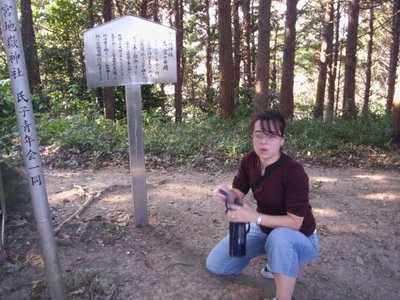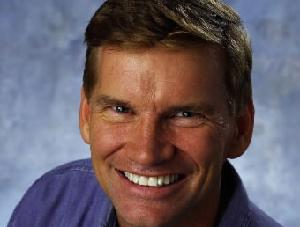Pages
▼
Saturday, November 04, 2006
The Wisdom of Robert Anton Wilson
Fnord:
I see as many positive possibilities as negative ones, and since the conclusion has not yet arrived I don't know which is going to happen, so it seems to me that worrying about the bad possibilities just gives you ulcers and makes you a generally miserable person and drags down the party wherever you go, whereas looking at the positives and spreading word about the positive possibilities keeps you high and happy and might even cheer up a few other people too, so since we don't know why not choose the happy path? Besides, as a Buddhist I really profoundly don't give a fuck! There's a little Chinese saying - "The wise become Confucian in good times, Buddhist in bad times and Taoist in old age" - that makes more sense to me all the time; I believe in Confucianism given in the sense of etiquette and good manners, courtesy and at least a minimum standard of decency for everybody. I believe in Buddhism to the extent of detachment because this is a pretty bad planet and a lot of bad things happen so you don't wanna get too attached to anything, and I'm becoming more and more of a Taoist because after reading about 20 different translations of the Tao Te Ching and looking up some of the Ideograms in my Chinese English dictionary and reading commentaries I think the basic message of Taoism is that it doesn't matter, fuck it all [laughs] - I have all three attitudes simultaneously, I can make things better by being nice to people, it doesn't really matter in Taoism and it's all a burning house anyway, so don't get too attached to it - that's Buddhism. I think it makes a nice mixture...
...In Illuminatus! [published 1970] I had terrorists blow one wall off the Pentagon - just like happened, and in Schrödinger's Cat [1980] I had Wall Street blown up just like what happened and I don't claim this is ESP or precognition, it's just common sense. The United States cannot go on bombing two thirds of the world year after year, decade after decade, over and over without somebody hitting back eventually, I knew it had to happen, you don't need ESP you just need a little horse sense. CNN keeps referring to it as "the day the world changed," well the world didn't change; people have been dropping munitions on one another ever since Nobel invented modern munitions. People love dropping bombs on one another, it's one of the favourite human pastimes, they're almost willing to give up football , I mean - it's been going on for ages, the only thing that changed is that the United States has been doing most of the bombing for the last 50 years and everybody got used to that, oh yeah we got to bomb another country for their own good, it's only collateral damage. The United States gets bombed and they say the world changed. The world didn't change, it's just the United States got included in with the rest of the world. If you go around bombing people year after year, decade after decade; you'll have somebody bombing you back, Jesus!, no, no; that's not the reason they did it, they hate us for our freedom , all the freedoms like the freedom to pee into a jar before you get a job interview, that's the kind of freedom we really need.
Hiking Miyajidake
Took a bit of a hike today up Miyajidake, just behind the local shrine. Nice little hike, though we didn't quite go all the way to the top. Though we thought we did at the time. Have to go back and do it right sometime.

We went alllllll the way up there.

Vanna White-style. Or is that The Price is Right?

As high as we went up today.

The Big Tree.

Cute! [She's pretty nice to look at too.]

Where's Waldo? Err... Sandy?

Remember, only you can prevent forest fires.

Rest break, Wonder Woman style.

Couple more pics here http://picasaweb.google.com/Rob.G.Pugh/20061104

We went alllllll the way up there.

Vanna White-style. Or is that The Price is Right?

As high as we went up today.

The Big Tree.

Cute! [She's pretty nice to look at too.]

Where's Waldo? Err... Sandy?

Remember, only you can prevent forest fires.

Rest break, Wonder Woman style.

Couple more pics here http://picasaweb.google.com/Rob.G.Pugh/20061104
Miscellany
The old floor chair pretty much gave up the ghost, so we picked up this new one. Notice the fine color coordination with our new kotatsu table set.
I feel a little gay now.

BBQ flavored chips come to Japan. Now if only they had a Taco Bell in Fukuoka, Sandy would never need go to America again.

New neighbors moving in gifted us with this fine new plant - the orchid - adding to our growing collection of flora.

I feel a little gay now.

BBQ flavored chips come to Japan. Now if only they had a Taco Bell in Fukuoka, Sandy would never need go to America again.

New neighbors moving in gifted us with this fine new plant - the orchid - adding to our growing collection of flora.

Halloween at Tsuyazaki Jr High
Friday, November 03, 2006
I've known, I think, two Boy Scouts.
This kinda explains a lot.
And the history of the two guys involved in developing scouting is actually pretty fascinating.
Via Outside Online:
And the history of the two guys involved in developing scouting is actually pretty fascinating.
Via Outside Online:
Since its beginning, Scouting has had something of a divided soul. Nothing illustrates that more clearly than the vastly different personalities of the two equally strange men who inspired it.
The worldwide movement started in England under the last great stiff-upper-lip hero of the Victorian age: Lt. General Sir Robert Baden-Powell. Baden-Powell won fame as a commander in the Boer War in 1900, when he'd held the town of Mafeking for seven months under siege by a much larger enemy force...
A famous photograph of Baden-Powell at Mafeking shows an almost painfully dapper little man with waxed mustache-ends, a swagger-stick, and laced boots that seem to extend halfway to his shoulders. It is pretty much a caricature of a repressive personality, and Baden-Powell, in fact, was committed to the repression of sexual desires of almost every sort, in everyone: His original manuscript of the Boy Scout handbook included an extensive chapter warning Scouts against the terrible hazards of "self-abuse."...
His American counterpart, Ernest Thompson Seton, was big, loose-limbed, and wild-eyed, with an unruly mop of black hair. A writer and illustrator of wilderness books, he rarely washed or shaved, and was known to emit unexpected wolf howls or moose mating calls in public. He espoused utopian socialism, feminism, and the restitution of the Great Plains to the Indians. Not surprisingly, his ideas on the proper upbringing of boys differed somewhat from Baden-Powell's. In 1902 he founded a group called the Woodcraft Indians, whose young members frolicked in feathered warbonnets and camped out in Sioux tepees. The idea, he said, was to release boys' "animal energy" and teach them to "think Indian."
Seton met Baden-Powell in 1906 and, with typical impulsive enthusiasm, lent his support to Baden-Powell's Boy Scout movement, which the Englishman would soon establish in America. Seton was given the title of Chief Scout and invited to write the first edition of the famous Handbook for Boys. Soon he came to regret his decision. "My aim was to make a man," he later wrote, "Baden-Powell's to make a soldier." The Scouts' uniforms, he believed, imposed conformity; the endless codes turned the boys into "a lot of little prigs." But the Boy Scouts of America flourished, while the Woodcraft Indians withered away. Though today the organization honors Seton as one of its founding fathers—Philmont's library is named after him—it drummed him out publicly during World War I, a response to his allegedly pacifist and anarchist views.
...While Troop 353 was out on the trail, the New Jersey Supreme Court ruled in favor of James Dale, a former Eagle Scout who'd been expelled as an assistant scoutmaster after officials discovered he was gay. Lawyers for the Boy Scouts of America were vowing to fight the decision in the U.S. Supreme Court.
Homosexuality is just one of the issues that has lately seemed to push the Boy Scouts, an ostensibly apolitical group, further into the camp of cultural conservatism. Within Scouting, people refer to its principal battles as "the three G's": gays, girls, and godlessness...
True, Spice said, there were occasional unpleasant decisions to be made. "There was a young man who worked here for several years—in a real leadership position on the ranch, actually. Great young guy. Well, he wrote to me one winter and said he'd decided he couldn't come back because it would violate the BSA policy on homosexuals. To tell the truth, I was sorry to see him go, because he's a good kid. But I believe we have a mandate from the clients who send their kids out here that they're going to be safe, out of harm's way, and not subjected to alternative lifestyles."
That was the official line. But I thought back to my first night in base camp, when I'd gone out to watch the meteor shower with Frank, a young staffer from the Midwest. Also joining us was Irma, a college-age Scout from Europe who was working at Philmont on a summer exchange program. (Frank and Irma are not their real names.) We drove in Frank's car out the main gate and down to a place where Route 21 swings in a high arcing loop eastward.
Here, at the top of the rise, Frank pointed out the constellations: Cassiopeia, Cygnus, Scorpius. Eventually he pulled a case of Coors out of the trunk, and then a bottle of bourbon. This spot was a popular one for Philmont staff to come and drink, it turned out, since it was just off ranch property and hence exempt from the rules. Before long a few other cars had pulled up. In the backseat of one, a staffer passed around a bong. Meanwhile, Frank and Irma had started making out against the hood of Frank's car.
Another car pulled up, and two more guys from base camp jumped out. The driver, a pale, lanky kid of 18 or 19, sat inside, smoking a cigarette. He wore one of the maroon Philmont staff polo shirts. He was very drunk.
"C'mon over here," he beckoned to me. He had a throaty southern accent. "Get closer. I wanna see your dick."
I stared at him, not sure I'd really heard him right: "What?"
"Yeah, c'mon, whip it out for me. I know you got a big one. Yer one of them tall, lean boys. Bet yer hung like a pony."
Then he called out to the two friends he'd arrived with. "Hey, I want somebody's dick in my face. Somebody whip it out and slap me with it."
"Yeah," said one of the guys, "let's all take our dicks out."
"Naw, let's get naked and run sprints again this time," his buddy said.
"So you guys are Boy Scouts, huh?" I joked.
"Yeah, Eagle Scouts. All three of us were."
"And hey, don' worry, we ain't fuckin' fairies or nothin'. We got girlfriends at college. We're just messin' around, y'know?"
"Hey c'mon, let's get naked. Let's get naked."
Soon their car and Frank's were the only two left on the hilltop. Frank detached himself from Irma and walked over. He was now drunk, too.
"Listen, man," he told me, "you're gonna have to ride back with these guys." He looked down. "I mean, sometimes you sort of just find a kindred soul and, well, shit, the flesh is weak. So, uh, anyway, I think we're staying up here tonight."
Feeling the obvious.
Who's One Beer Short of a Six-Pack
via Overheard in the Office, Nov 3, 2006
Bartender #1: How many beers are in a six-pack?
Bartender #2: I work with a fucking idiot.
Subiaco, Australia
Overheard by: I'm ordering wine
via Overheard in the Office, Nov 3, 2006
It never fails. *updated*
Positively Jungian, yes?
Via the DenverPost.com:

**Update** Via NPR:
Via ABC:
"...I never used" the drugs I bought.
Riiiiiiight.
See, this is the same old, same old. First - the absolute denial. Then - when you see there's actual evidence against you - in this case the saved voice mails - you "confess" only to those things you think that can absolutely, beyond a shadow of a doubt, be proven against you.
He makes Baby Jesus cry.
You know, I hope there's video somewhere. I can't stand hypocritical religious folk who make careers out of condemning others [to an eternity of painful torture in hell, mind you] for the same things they do behind closed doors. Goes to show - thanks Jung - anyone who spends an inordinate amount of time railing against the "failings" of others more than likely has that issue themselves.
But it does make me happy to think that a good deal of hatred spitting homophobes are gay. Really gay. Like assless-chaps-San Francisco-gay.
Via the DenverPost.com:
Ted Haggard, one of the most prominent evangelical pastors in the nation, resigned today as president of the National Association of Evangelicals amid allegations that he carried on a three-year sexual relationship with a male prostitute.C'mon, look at the picture. Even MY gaydar goes off on that one.

**Update** Via NPR:
Haggard Admits Buying Drugs, Getting Massage
Via ABC:
Haggard denied the sex allegations but said that he did buy meth from the man because he was curious."Massage."
"I bought it for myself but never used it," he said. "I was tempted, but I never used it."
"...I never used" the drugs I bought.
Riiiiiiight.
See, this is the same old, same old. First - the absolute denial. Then - when you see there's actual evidence against you - in this case the saved voice mails - you "confess" only to those things you think that can absolutely, beyond a shadow of a doubt, be proven against you.
He makes Baby Jesus cry.
You know, I hope there's video somewhere. I can't stand hypocritical religious folk who make careers out of condemning others [to an eternity of painful torture in hell, mind you] for the same things they do behind closed doors. Goes to show - thanks Jung - anyone who spends an inordinate amount of time railing against the "failings" of others more than likely has that issue themselves.
But it does make me happy to think that a good deal of hatred spitting homophobes are gay. Really gay. Like assless-chaps-San Francisco-gay.
The monthly reading list for Oct 06
Attractor Factor and Life's Missing Instruction Manual, by Joe Vitale - both "positive psychology" books with a wealth of practical and useful insight. Both'll be worth re-reading.
Loving What Is by Byron Katie - Katie is the creator of a therapy called "The Work" that consists of approaching any situation, trouble or trauma with four questions - "Is that true?", "Can you absolutely know that it's true?", "How do you react when you think that thought?", and "Who would you be without that thought?"
At it's core is the idea that I've read over and over in various forms, from Zen to Dan Millman to existentialism to NLP to Robert Anton Wilson ["Who is the mystic who makes the grass green?"] and the crux of it all is this - we don't experience the world... what we experience are our ideas and stories about the world. From the book - "...the whole world is simply my story, projected back to me on the screen of my own perception."
The book was very, very good. But occasionally disconcerting. It had what felt to me to be a very feminine feel to it, though I couldn't exactly say why... or why it felt... strange... to me. It was pretty interesting to read experiences of how she applied the four questions in helping victims of abuse and rape deal with their experiences.
The points I want to take from the book are these - there are no "should"'s, your happiness is your own responsibility [as is your pain], let it go, victimization is a choice and "it's hopeless to try to control someone else's awareness or behavior."
There's also this bit in her work called the turnaround, where you [caution - vast oversimplification ahead] take whatever hurts or pains or insecurities you feel that others have caused you and "turn it around" to see how you've actually done those things to them, or to yourself. For me, and fair warning, navel gazing occurs... now... I've always had this sense of seeking approval and friendship and connection from others, be it family or friends, of craving this sense of validation of who I am or what I do... but playing around with the Work, it seems a lot more likely that the truth of that feels more like what I really want, is not that sense of approval from others, but from myself.
Work in progress.
Working with your Three Selves by Bella Karish - modern day Huna, a complex arrangement of traditional Hawaiian religious ideas with 19th century spiritualism [or ancient wisdoms, take your pick] postulates "three selves" - the basic self, the middle self and the higher self. There is some crossover with psychology's id, ego and superego, but it's vastly different in other ways. This wasn't a bad read, but it didn't quite gel with me. I think the Christian overtones made it a little difficult for me, even though it was a fair stretch from "traditional" Christianity. And the writing style didn't exactly click with me either. Still... good information. But I'd recommend first Millman's Sacred Journey of the Peaceful Warrior or Fundamentals of Hawaiian Mysticism by Berney as they resonated quite a bit more with me with the same material.
Freakonomics by Levitt and Dubner - pretty well known little book. I remember it getting quite a bit of press on the morning shows back when I lived in VA, and was forced to watch the Today Show every AM at the Security Console. But I digress... the book was a birthday present from the ever thoughtful fellow ALT Kathy, and it was a thoroughly enjoyable read. My fave chapter was the one "discovering cheating as applied to teachers and sumo wrestlers." The summary for that, via Wikipedia -
The idea that all human behavior could be reduced to math [if only we could account for all the variables!] strikes me as false, but it was a fun and interesting read. Thanks for the book Kathy!
What Remains by Ry Beville - draft of a fiction novel written by a friend of mine currently living in Tokyo. A journey of "self-discovery" about a man from Virginia who travels to Japan to inter his mother's ashes. Not my normal reading, and a draft, so it needs some editing, but I found it was really well written and he consistently drew me into the story. Clever, occasionally insightful, with interesting and well thought out characters. He's gotten some interest from literary agents and I'd say it's definitely worth checking out if it gets printed. He's also done some translations of Japanese poetry that've been published, see Nakahara Chuya, and has his own Flickr account where he posts entirely too many pictures of himself surfing and drinking. I kid. Some really nice photos there. The Foamy Green's photos
IronMind by Randall Strossen - sports psychology as it applies to weight training. Good book, though I think I was expecting something more along the lines of Dinosaur Training... once again, the curse of expectations makes life difficult. Excellent read though.
DC Universe: Helltown by Dennis "Denny" O'Neil - back in the late 1980's, there was a comic book called The Question, written by Denny O'Neil with art by Denys Cowan. It was probably my first real introduction to eastern philosophy and along with Frank Miller's The Dark Knight Returns and Alan Moore's Watchmen, showed me what the medium of comics was capable of. So, 20 years later, Denny writes a novel that condenses, plays with and reinterprets about three years of the comic book series.
Ecotopia Emerging by Ernest Callenbach - the sequel/prequel to Ecotopia, which I read earlier about how sections of the northwest USA secede into its own "green" country called Ecotopia. Lots of great ideas, even if the prose is occasionally slightly heavy handed. But the ideas within and the clarity with which they point out the insanities of the structures of modern America are worth the read. Reading the bits about wars for oil in the Mideast and American dependence on limited energy resources - surely not unthought of when the book was written in the late 70's - seems all the more appropriate now.
Re-read - An Unlikely Prophet by Alvin Schwartz. I read this years ago, and think I passed on that copy to Johnny. It's [non-fiction? kinda? maybe?] about a writer of Superman and Batman comics from the 50's who writes about his experiences with a Tibetan tulpa, and the tulpa of Superman. For those who might not know what the big deal of that is... well... tulpas are
Yep, that about sums me up I guess.
Loving What Is by Byron Katie - Katie is the creator of a therapy called "The Work" that consists of approaching any situation, trouble or trauma with four questions - "Is that true?", "Can you absolutely know that it's true?", "How do you react when you think that thought?", and "Who would you be without that thought?"
At it's core is the idea that I've read over and over in various forms, from Zen to Dan Millman to existentialism to NLP to Robert Anton Wilson ["Who is the mystic who makes the grass green?"] and the crux of it all is this - we don't experience the world... what we experience are our ideas and stories about the world. From the book - "...the whole world is simply my story, projected back to me on the screen of my own perception."
The book was very, very good. But occasionally disconcerting. It had what felt to me to be a very feminine feel to it, though I couldn't exactly say why... or why it felt... strange... to me. It was pretty interesting to read experiences of how she applied the four questions in helping victims of abuse and rape deal with their experiences.
The points I want to take from the book are these - there are no "should"'s, your happiness is your own responsibility [as is your pain], let it go, victimization is a choice and "it's hopeless to try to control someone else's awareness or behavior."
There's also this bit in her work called the turnaround, where you [caution - vast oversimplification ahead] take whatever hurts or pains or insecurities you feel that others have caused you and "turn it around" to see how you've actually done those things to them, or to yourself. For me, and fair warning, navel gazing occurs... now... I've always had this sense of seeking approval and friendship and connection from others, be it family or friends, of craving this sense of validation of who I am or what I do... but playing around with the Work, it seems a lot more likely that the truth of that feels more like what I really want, is not that sense of approval from others, but from myself.
Work in progress.
Working with your Three Selves by Bella Karish - modern day Huna, a complex arrangement of traditional Hawaiian religious ideas with 19th century spiritualism [or ancient wisdoms, take your pick] postulates "three selves" - the basic self, the middle self and the higher self. There is some crossover with psychology's id, ego and superego, but it's vastly different in other ways. This wasn't a bad read, but it didn't quite gel with me. I think the Christian overtones made it a little difficult for me, even though it was a fair stretch from "traditional" Christianity. And the writing style didn't exactly click with me either. Still... good information. But I'd recommend first Millman's Sacred Journey of the Peaceful Warrior or Fundamentals of Hawaiian Mysticism by Berney as they resonated quite a bit more with me with the same material.
Freakonomics by Levitt and Dubner - pretty well known little book. I remember it getting quite a bit of press on the morning shows back when I lived in VA, and was forced to watch the Today Show every AM at the Security Console. But I digress... the book was a birthday present from the ever thoughtful fellow ALT Kathy, and it was a thoroughly enjoyable read. My fave chapter was the one "discovering cheating as applied to teachers and sumo wrestlers." The summary for that, via Wikipedia -
One striking example of the authors' creative use of economic theory involves demonstrating the existence of cheating among Sumo wrestlers. In a Sumo tournament, all wrestlers compete in fifteen matches to stay in the top leagues. The Sumo community is also very close-knit, and all of the wrestlers at the top levels tend to know each other well. The authors looked at the final match, and considered the case of a 7-7 wrestler (i.e. a wrestler with seven wins and seven losses, and one fight to go) fighting against an 8-6 wrestler. Statistically, the 7-7 wrestler should have a slightly below even chance, since the 8-6 wrestler is slightly better. However, the 7-7 wrestler actually wins around 80% of the time. Levitt concludes that those who already have 8-6 collude with those who are 7-7 and let them win, since they have already secured their place in the league....my father in law would be disappointed.
The idea that all human behavior could be reduced to math [if only we could account for all the variables!] strikes me as false, but it was a fun and interesting read. Thanks for the book Kathy!
What Remains by Ry Beville - draft of a fiction novel written by a friend of mine currently living in Tokyo. A journey of "self-discovery" about a man from Virginia who travels to Japan to inter his mother's ashes. Not my normal reading, and a draft, so it needs some editing, but I found it was really well written and he consistently drew me into the story. Clever, occasionally insightful, with interesting and well thought out characters. He's gotten some interest from literary agents and I'd say it's definitely worth checking out if it gets printed. He's also done some translations of Japanese poetry that've been published, see Nakahara Chuya, and has his own Flickr account where he posts entirely too many pictures of himself surfing and drinking. I kid. Some really nice photos there. The Foamy Green's photos
IronMind by Randall Strossen - sports psychology as it applies to weight training. Good book, though I think I was expecting something more along the lines of Dinosaur Training... once again, the curse of expectations makes life difficult. Excellent read though.
DC Universe: Helltown by Dennis "Denny" O'Neil - back in the late 1980's, there was a comic book called The Question, written by Denny O'Neil with art by Denys Cowan. It was probably my first real introduction to eastern philosophy and along with Frank Miller's The Dark Knight Returns and Alan Moore's Watchmen, showed me what the medium of comics was capable of. So, 20 years later, Denny writes a novel that condenses, plays with and reinterprets about three years of the comic book series.
"Newly arrived in crime-plagued Hub City, Vic Sage doesn't plan to be a hero. He wants only to uncover his own mysterious past. Working as a reporter for a local radio station, Vic gets too close to a deadly story and is nearly murdered-when he's rescued by mercurial assassin Lady Shiva, trained by martial arts master Richard Dragon, and given a new identity by Batman. Now reborn as The Question, Vic Sage vows to destroy a vast, corrupt conspiracy involving Hub City's most powerful men. But as he seeks the elusive truth, Vic will find that the answers may prove fatal…"It. Was. Awesome.
Ecotopia Emerging by Ernest Callenbach - the sequel/prequel to Ecotopia, which I read earlier about how sections of the northwest USA secede into its own "green" country called Ecotopia. Lots of great ideas, even if the prose is occasionally slightly heavy handed. But the ideas within and the clarity with which they point out the insanities of the structures of modern America are worth the read. Reading the bits about wars for oil in the Mideast and American dependence on limited energy resources - surely not unthought of when the book was written in the late 70's - seems all the more appropriate now.
Re-read - An Unlikely Prophet by Alvin Schwartz. I read this years ago, and think I passed on that copy to Johnny. It's [non-fiction? kinda? maybe?] about a writer of Superman and Batman comics from the 50's who writes about his experiences with a Tibetan tulpa, and the tulpa of Superman. For those who might not know what the big deal of that is... well... tulpas are
in Tibetan mysticism, a being or object which is created through sheer willpower alone. In other words, it is a materialized thought that has taken physical form (a thoughtform).[Thanks Wikipedia] So... Tibetan mysticism, quantum physics and comic books.
Yep, that about sums me up I guess.
Tuesday, October 31, 2006
I kid you not.
Up there with the greatest headlines ever.
Via Warren Ellis.
Via Warren Ellis.
Corrupt scientist attempts to buy mammoth cells from the Russian Mafiya
The monkey's kung fu remains strong.
Via, obviously, KungFu Monkey:
...the separation of Church and State is there for a reason. It's a good reason: once one side of the political debate claims God, then their opponents are against God. A "good heart" matters more than the facts. To change policy is to reflect doubt in God's plan. To question the mortal, fallible men in authority is to question God himself.
And on a gut level, way down in the limbic system, we know/are memetically programmed to believe those against God are not wrong or simply have different opinions, they are evil.
...Let's just say that when one is accused of being unpatriotic because one opposes an Evangelical administration which favours torture, we are all the way through the Looking Glass.
Hah!
Via comedic comic book blog BeaucoupKevin(dot)com:
Some Neoconservatives are upset at Battlestar Galactica. You know, if your political views mean that you are bothered that the show features an ineffectual leader, condemns secret trials and executions, and features insurgents as heroes against a foreign menace, then maybe you need to take a look at who you're supporting.
Monday, October 30, 2006
Because it bears repeating.
“The world is like a ride at an amusement park. And when you choose to go on it, you think it's real because that's how powerful our minds are. And the ride goes up and down and round and round. It has thrills and chills and it's very brightly coloured and it's very loud and it's fun, for a while. Some people have been on the ride for a long time, and they begin to question: Is this real, or is this just a ride? And other people have remembered, and they come back to us, they say, "Hey – don't worry, don't be afraid ever, because this is just a ride." And we… kill those people. "Shut him up. We have a lot invested in this ride. Shut him up. Look at my furrows of worry. Look at my big bank account and my family. This just has to be real." It's just a ride. But we always kill those good guys who try and tell us that, you ever notice that? And let the demons run amok. But it doesn't matter, because – it's just a ride. And we can change it anytime we want. It's only a choice. No effort, no work, no job, no savings and money. A choice, right now, between fear and love. The eyes of fear want you to put bigger locks on your doors, buy guns, close yourself off. The eyes of love instead see all of us as one. Here's what we can do to change the world, right now, to a better ride. Take all that money we spend on weapons and defenses each year and instead spend it feeding and clothing and educating the poor of the world, which it would pay for many times over, not one human being excluded, and we could explore space, together, both inner and outer, forever, in peace.”- Bill Hicks
TIME.com: The Secret Letter from Iraq
From TIME.com:
Written last month, this straightforward account of life in Iraq by a Marine officer was initially sent just to a small group of family and friends. His honest but wry narration and unusually frank dissection of the mission contrasts sharply with the story presented by both sides of the Iraq war debate, the Pentagon spin masters and fierce critics...Most Surreal Moment — Watching Marines arrive at my detention facility and unload a truck load of flex-cuffed midgets. 26 to be exact. We had put the word out earlier in the day to the Marines in Fallujah that we were looking for Bad Guy X, who was described as a midget. Little did I know that Fallujah was home to a small community of midgets, who banded together for support since they were considered as social outcasts...
Most Profound Man in Iraq — an unidentified farmer in a fairly remote area who, after being asked by Reconnaissance Marines if he had seen any foreign fighters in the area replied "Yes, you..."
Coolest Insurgent Act — Stealing almost $7 million from the main bank in Ramadi in broad daylight, then, upon exiting, waving to the Marines in the combat outpost right next to the bank, who had no clue of what was going on. The Marines waved back. Too cool...
Biggest Hassle — High-ranking visitors. More disruptive to work than a rocket attack. VIPs demand briefs and "battlefield" tours (we take them to quiet sections of Fallujah, which is plenty scary for them). Our briefs and commentary seem to have no effect on their preconceived notions of what's going on in Iraq...
Biggest Outrage — Practically anything said by talking heads on TV about the war in Iraq, not that I get to watch much TV. Their thoughts are consistently both grossly simplistic and politically slanted. Biggest Offender: Bill O'Reilly...
Best Chuck Norris Moment — 13 May. Bad Guys arrived at the government center in a small town to kidnap the mayor, since they have a problem with any form of government that does not include regular beheadings and women wearing burqahs. There were seven of them. As they brought the mayor out to put him in a pick-up truck to take him off to be beheaded (on video, as usual), one of the Bad Guys put down his machine gun so that he could tie the mayor's hands. The mayor took the opportunity to pick up the machine gun and drill five of the Bad Guys. The other two ran away. One of the dead Bad Guys was on our top twenty wanted list. Like they say, you can't fight City Hall...



